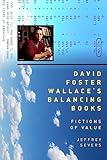David Foster Wallace's Balancing Books : Fictions of Value / Jeffrey Severs.
Material type: TextPublisher: New York, NY : Columbia University Press, [2016]Copyright date: ©2017Description: 1 online resource (328 p.)Content type:
TextPublisher: New York, NY : Columbia University Press, [2016]Copyright date: ©2017Description: 1 online resource (328 p.)Content type: - 9780231179447
- 9780231543118
- 813.54 23
- PS3573.A425635 Z864 2017
- PS3573.A425635 Z864 2019
- online - DeGruyter
| Item type | Current library | Call number | URL | Status | Notes | Barcode | |
|---|---|---|---|---|---|---|---|
 eBook
eBook
|
Biblioteca "Angelicum" Pont. Univ. S.Tommaso d'Aquino Nuvola online | online - DeGruyter (Browse shelf(Opens below)) | Online access | Not for loan (Accesso limitato) | Accesso per gli utenti autorizzati / Access for authorized users | (dgr)9780231543118 |
Browsing Biblioteca "Angelicum" Pont. Univ. S.Tommaso d'Aquino shelves, Shelving location: Nuvola online Close shelf browser (Hides shelf browser)

|

|

|

|

|

|

|
||
| online - DeGruyter Exception Taken : How France Has Defied Hollywood's New World Order / | online - DeGruyter From Head Shops to Whole Foods : The Rise and Fall of Activist Entrepreneurs / | online - DeGruyter A History of Housing in New York City / | online - DeGruyter David Foster Wallace's Balancing Books : Fictions of Value / | online - DeGruyter After Uniqueness : A History of Film and Video Art in Circulation / | online - DeGruyter Reform Cinema in Iran : Film and Political Change in the Islamic Republic / | online - DeGruyter Unmaking Love : The Contemporary Novel and the Impossibility of Union / |
Frontmatter -- CONTENTS -- Note on the Texts -- Acknowledgments -- INTRODUCTION: A LIVING TRANSACTION: VALUE, GROUND, AND BALANCING BOOKS -- 1. COME TO WORK: CAPITALIST FANTASIES AND THE QUEST FOR BALANCE IN THE BROOM OF THE SYSTEM -- 2. NEW DEALS: (THE) DEPRESSION AND DEVALUATION IN THE EARLY STORIES -- 3. DEI GRATIA : WORK ETHIC, GRACE, AND GIVING IN INFINITE JEST -- 4. OTHER MATH: HUMAN COSTS, FRACTIONAL SELVES, AND NEOLIBERAL CRISIS IN BRIEF INTERVIEWS WITH HIDEOUS MEN -- 5. HIS CAPITAL FLUSH: DESPAIRING OVER WORK AND VALUE IN OBLIVION -- 6. E PLURIBUS UNUM : RITUAL, CURRENCY, AND THE EMBODIED VALUES OF THE PALE KING -- CONCLUSION: IN LINE FOR THE CASH REGISTER WITH WALLACE -- Notes -- Bibliography -- Index
restricted access online access with authorization star
http://purl.org/coar/access_right/c_16ec
What do we value? Why do we value it? And in a neoliberal age, can morality ever displace money as the primary means of defining value? These are the questions that drove David Foster Wallace, a writer widely credited with changing the face of contemporary fiction and moving it beyond an emotionless postmodern irony. Jeffrey Severs argues in David Foster Wallace's Balancing Books that Wallace was also deeply engaged with the social, political, and economic issues of the twentieth and twenty-first centuries. A rebellious economic thinker, Wallace satirized the deforming effects of money, questioned the logic of the monetary system, and saw the world through the lens of value's many hidden and untapped meanings. In original readings of all of Wallace's fiction, from The Broom of the System and Infinite Jest to his story collections and The Pale King, Severs reveals Wallace to be a thoroughly political writer whose works provide an often surreal history of financial crises and economic policies.As Severs demonstrates, the concept of value occupied the intersection of Wallace's major interests: economics, work, metaphysics, mathematics, and morality. Severs ranges from the Great Depression and the New Deal to the realms of finance, insurance, and taxation to detail Wallace's quest for balance and grace in a world of excess and entropy. Wallace showed characters struggling to place two feet on the ground and restlessly sought to "balance the books" of a chaotic culture. Explaining why Wallace's work has galvanized a new phase in contemporary global literature, Severs draws connections to key Wallace forerunners Don DeLillo, Thomas Pynchon, and William Gaddis, as well as his successors—including Dave Eggers, Teddy Wayne, Jonathan Lethem, and Zadie Smith—interpreting Wallace's legacy in terms of finance, the gift, and office life.
Mode of access: Internet via World Wide Web.
In English.
Description based on online resource; title from PDF title page (publisher's Web site, viewed 25. Jun 2024)


